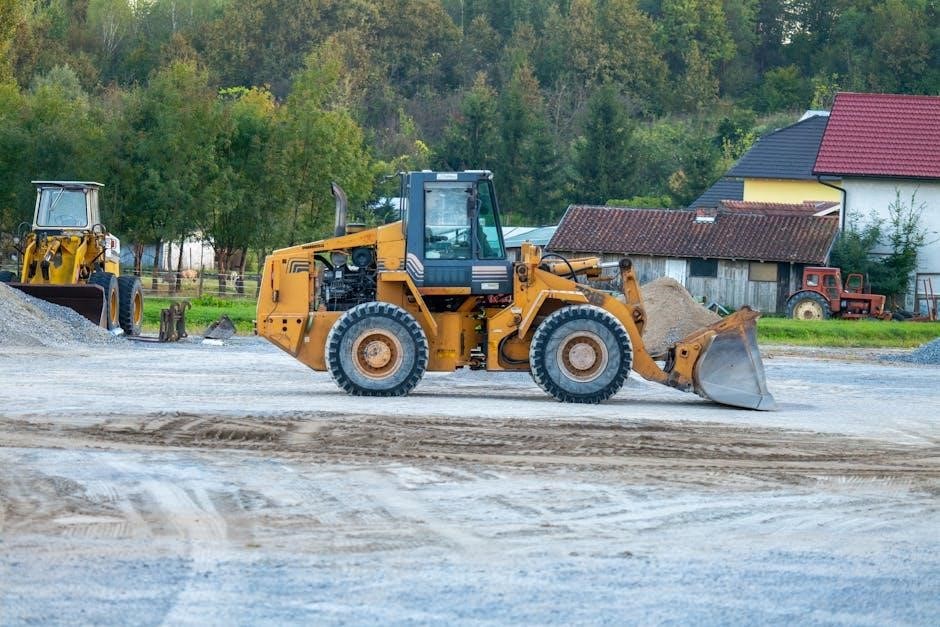A foreman oversees construction projects, ensuring tasks are completed safely and efficiently. They plan work, coordinate teams, and manage resources to meet project goals and standards effectively.
1.1 Overview of the Foreman Role
The foreman serves as a key supervisor in construction projects, overseeing daily operations and ensuring tasks are executed efficiently. They are responsible for planning work schedules, coordinating site operatives, and managing resources. The role involves supervising construction teams, ensuring safety protocols are followed, and maintaining quality standards. Foremen act as intermediaries between workers and project managers, addressing issues and ensuring compliance with legal and company requirements. Their oversight is crucial for meeting project deadlines and delivering results that align with specified plans and objectives.
1.2 Importance of a Foreman in Construction Projects
A foreman plays a vital role in ensuring the smooth execution of construction projects. They provide leadership, coordinate tasks, and maintain safety and quality standards. By supervising site operatives and managing resources, foremen ensure projects are completed on time and within budget. Their ability to address issues promptly and communicate effectively with both workers and management is crucial for project success. The foreman’s oversight ensures compliance with legal requirements and company policies, making them indispensable for achieving efficient and safe construction outcomes.
Key Responsibilities of a Foreman
A foreman is responsible for overseeing daily operations, ensuring safety and quality standards, coordinating tasks, managing resources, resolving site issues, and ensuring project deadlines are met efficiently.
2.1 Planning and Scheduling Work
The foreman creates detailed schedules based on project timelines, ensuring tasks are prioritized and allocated efficiently. They monitor progress, adjust plans as needed, and maintain alignment with overall project goals to meet deadlines effectively.
2.2 Coordinating Subcontractors and Site Operatives
The foreman coordinates subcontractors and site operatives, ensuring seamless collaboration and efficient resource allocation. They allocate tasks, manage workflows, and maintain clear communication to ensure all parties work cohesively towards project objectives while adhering to safety and quality standards.
2.3 Ensuring Safety Compliance and Quality Standards
The foreman ensures compliance with safety regulations and quality standards by conducting regular site inspections and audits. They enforce adherence to health, safety, and environmental protocols, addressing potential hazards promptly. The foreman also verifies that all work meets specified quality benchmarks, documenting compliance and addressing deviations. This role involves promoting a culture of safety and excellence, ensuring that all site operatives and subcontractors follow established guidelines to maintain high standards throughout the project execution.

Coordination and Communication
Foremen facilitate clear communication between teams, coordinate tasks, and interpret plans to ensure alignment with project goals, while documenting issues for timely resolution and smooth execution.
3.1 Liaising with Project Managers and Supervisors
The foreman acts as a key link between site operatives and upper management, ensuring seamless communication. They regularly update project managers and supervisors on progress, addressing challenges promptly to maintain project timelines. By fostering strong relationships, foremen facilitate effective collaboration, aligning site activities with broader project objectives. This liaison role ensures that all stakeholders are informed, fostering a cohesive and efficient work environment that meets safety and quality standards consistently.

3.2 Reading and Interpreting Plans and Specifications
The foreman is responsible for accurately interpreting project plans, blueprints, and specifications to ensure all work aligns with design and engineering requirements. They analyze technical details, identify potential issues, and provide clear instructions to site operatives. This role requires strong attention to detail and the ability to translate complex documentation into actionable steps, ensuring compliance with quality and safety standards while maintaining project timelines and budgets effectively.

3.4 Documenting Scope Gaps and Issues
The foreman identifies and documents discrepancies between project plans and actual site conditions, ensuring issues are addressed promptly. They maintain detailed records of scope gaps, communicate them to project managers, and propose solutions. This involves tracking deviations from specifications, monitoring progress, and ensuring compliance with project requirements. Accurate documentation helps mitigate risks, resolve conflicts, and maintain accountability, ensuring projects stay on track and meet quality standards. Proper records also support future planning and compliance audits, making this a critical part of the foreman’s role.
Safety and Legal Compliance
Foremen ensure adherence to health, safety, and environmental regulations, conducting site inspections and audits to maintain compliance and safeguard personnel and equipment, upholding legal standards.
4.1 Implementing Health, Safety, and Environment (HSE) Legislation
Foremen are responsible for enforcing HSE regulations, ensuring all safety protocols are followed. They conduct regular site inspections, audits, and risk assessments to identify and mitigate hazards. They also ensure that all personnel adhere to safety procedures, use personal protective equipment, and receive necessary training. Implementing HSE legislation is critical to preventing accidents, protecting the environment, and ensuring compliance with legal requirements. Their role is pivotal in maintaining a safe and sustainable work environment.
4.2 Conducting Site Inspections and Safety Audits
Foremen conduct regular site inspections and safety audits to identify potential risks and ensure compliance with safety standards. They inspect equipment, processes, and work environments to detect hazards, addressing issues promptly to prevent accidents. These inspections are documented, and corrective actions are implemented to maintain a safe working environment. By proactively monitoring site conditions, foremen play a crucial role in safeguarding personnel and ensuring adherence to safety protocols and legal requirements.
4.3 Managing Emergency Procedures and Incidents
Foremen are responsible for managing emergency procedures and incidents on construction sites. They develop and implement emergency response plans, ensuring all personnel are trained and prepared. In case of incidents, foremen coordinate with emergency services, secure the site, and investigate root causes. They document incidents, assess damages, and implement corrective actions to prevent future occurrences. Effective communication and decision-making are critical to minimize risks and ensure a safe recovery process, adhering to safety protocols and legal requirements.

Material and Equipment Management
Foremen manage material and equipment, ensuring adequate supplies, coordinating usage, and maintaining inventory. They estimate needs, requisition supplies, and ensure tools and spares are readily available for tasks.
5.1 Estimating and Requisitioning Supplies
Foremen are responsible for estimating material and equipment needs based on project requirements. They prepare requisition orders, ensure timely delivery, and maintain accurate inventory records. This involves assessing project timelines, budget constraints, and supplier reliability to avoid shortages or overstocking. Effective communication with suppliers and project managers is crucial to secure necessary resources, ensuring smooth project execution without delays. Proper documentation and approval processes are followed to maintain accountability and transparency in supply management.
5.2 Coordinating Equipment Usage with Other Foremen
Foremen collaborate with other foremen to optimize equipment allocation, ensuring efficient project execution. They coordinate machinery usage, prevent conflicts, and adhere to safety protocols. By communicating effectively, they allocate resources based on priority tasks, minimizing downtime and maximizing productivity. This coordination ensures seamless workflow across construction sites, aligning equipment deployment with project timelines and objectives. Proper scheduling and resource management are critical to maintaining operational efficiency and meeting deadlines.
5.3 Ensuring Availability of Essential Tools and Spares
Foremen are responsible for maintaining an inventory of essential tools and spares, ensuring they are readily available for crew members. This involves regular stock checks, timely procurement, and proper storage. They anticipate equipment needs based on project schedules and allocate resources efficiently. Any shortages or damages are addressed promptly to prevent workflow disruptions. By ensuring tool availability, foremen contribute to the smooth execution of tasks, enhancing team productivity and adherence to project timelines. This role is crucial for maintaining operational efficiency on construction sites.
Leadership and Team Management
The foreman provides strong leadership, supervising teams, offering guidance, and monitoring performance to ensure efficient project execution and high-quality results while fostering a productive work environment.
6.1 Supervising Construction Teams
The foreman directly oversees construction teams, ensuring tasks are executed according to plans and schedules. They allocate responsibilities, monitor progress, and address any issues promptly to maintain efficiency and safety. By providing clear instructions and support, they ensure that all team members understand their roles and work collaboratively to achieve project goals. Effective supervision also involves addressing conflicts and motivating the team to uphold quality and safety standards throughout the project duration.
6.2 Providing Guidance and Training to Site Operatives
The foreman is responsible for providing clear guidance and training to site operatives, ensuring they understand and follow project procedures, safety protocols, and quality standards. They assist in skill development, address performance gaps, and ensure all team members are equipped to perform their tasks effectively. This includes demonstrating proper techniques, explaining safety measures, and fostering a culture of continuous improvement. By investing time in training, the foreman helps operatives work efficiently and safely, contributing to the overall success of the construction project.
6.3 Monitoring Attendance and Performance of Staff
The foreman monitors staff attendance and performance, ensuring optimal productivity and accountability. They track work hours, absenteeism, and adherence to schedules, addressing any issues promptly. By evaluating performance, the foreman identifies areas for improvement, provides constructive feedback, and sets achievable goals. This oversight helps maintain a motivated and efficient workforce, aligning individual efforts with project objectives. Regular performance reviews and attendance tracking are essential tools for the foreman to ensure smooth project execution and meet deadlines effectively.

Problem-Solving and Decision-Making
The foreman addresses potential issues, makes timely decisions to meet deadlines, and applies problem-solving skills to overcome construction challenges, ensuring project continuity and success.
7.1 Identifying and Addressing Potential Issues
The foreman proactively monitors construction activities to identify potential issues before they escalate. They address problems by collaborating with teams, reallocating resources, and implementing safety protocols. By analyzing project progress and communicating effectively, the foreman ensures timely resolutions, minimizing delays and risks. This includes resolving conflicts, managing unexpected site conditions, and documenting issues for future reference. Effective problem-solving ensures project continuity, adherence to safety standards, and successful outcomes.
7.2 Making Decisions to Meet Project Deadlines
The foreman plays a pivotal role in making timely decisions to ensure projects meet deadlines. By proactively planning and reallocating resources, they prioritize tasks to maintain progress. The foreman assesses risks, resolves conflicts, and adjusts schedules as needed. Effective decision-making involves collaborating with teams, subcontractors, and managers to address delays. They also allocate manpower and materials strategically to stay on track. By addressing unforeseen challenges promptly, the foreman ensures projects are completed efficiently and within the specified timelines, upholding quality and safety standards.
7.3 Utilizing Problem-Solving Skills for Construction Challenges
Foremen use strong problem-solving skills to tackle construction challenges effectively. They identify potential issues early, analyze root causes, and implement practical solutions. Whether it’s material shortages or unexpected site conditions, the foreman evaluates options and selects the best course of action. By leveraging experience and creativity, they minimize delays and ensure continuous workflow. Effective problem-solving also involves clear communication with teams and stakeholders to align on resolutions. This ability to adapt and resolve issues efficiently is crucial for maintaining project momentum and achieving desired outcomes.



